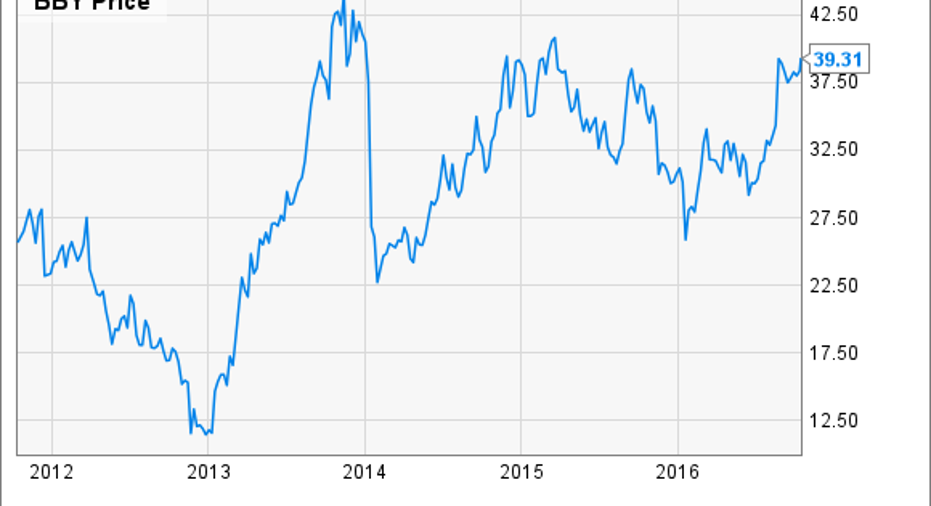Samsung's Galaxy Note 7 Debacle Could Hurt Best Buy's Momentum

Earlier this month, Samsung (NASDAQOTH: SSNLF) finally pulled the plug on its Galaxy Note 7 phone, after failing to fix battery-related problems that caused some phones to spontaneously catch fire. Samsung is now recalling all Galaxy Note 7 phones at great cost to itself. It expects the total cost of discontinuing and recalling the Note 7 to be at least $5.3 billion.
Samsung's Galaxy Note 7 could have been a big seller. Image source: Samsung.
However, Samsung may not be the only casualty from this scandal. Samsung's retail partners will also share in the pain without the Galaxy Note 7 to drive sales this fall. Best Buy (NYSE: BBY) could be particularly hard hit.
It could have been a huge success
Upon its initial release two months ago, the Samsung Galaxy Note 7 won high praise from pundits. The Verge called it "Samsung's best device ever, and arguably the best big phone ever made."
In an environment where smartphone sales have been hurt by lengthening replacement cycles, the Galaxy Note 7 was compelling enough to spark upgrades. Now that it's out of the picture, fewer people may choose to buy a new phone this fall. Furthermore, early adopters of the Galaxy Note 7 might just go back to using their previous devices rather than trading in their recalled phone for a new Apple (NASDAQ: AAPL) or Android device.
Back in August, Best Buy's management raised its full-year operating income guidance and projected that revenue would return to growth in the back half of the year. Improving phone sales were a critical piece of that forecast. Samsung's inability to solve the Galaxy Note 7's battery problems will weigh on Best Buy's sales in the second half of the fiscal year.
Gains by Apple won't help Best Buy
Best Buy is particularly exposed to Samsung's fortunes in the smartphone market because it has opened hundreds of Samsung Experience Shops within its Best Buy stores since 2013. These shops, which offer more Samsung-specific product expertise than other retailers, have probably helped Best Buy snag a hefty share of Samsung device sales.
Thus, to the extent that consumers switch away from Samsung to other high-end smartphone manufacturers, they may be less likely to buy their new devices at Best Buy.
Best Buy has opened numerous Samsung mini-shops within its stores. Image source: The Motley Fool.
If Apple capitalizes on Samsung's miscue, it could be even worse for Best Buy. Apple offers third-party retailers like Best Buy notoriously slim margins on the iPhone. Thus, retailers can rack up a lot of revenue from selling iPhones, but unless they can get buyers to pick up high-margin accessories or make other purchases, they won't be making much of a profit.
The recall could be costly
Finally, Best Buy is likely to incur elevated costs related to the Galaxy Note 7 recall. All of the Galaxy Note 7 devices that Best Buy has sold in the past two months are now going to be returning to Best Buy stores.
Processing these returns will use valuable labor, either pulling employees away from their main job (selling products) or forcing Best Buy to increase staffing. It's not clear whether it will get any compensation from Samsung for its trouble.
An untimely setback
Best Buy stock has rallied since August, approaching its late 2013 high. Best Buy's better-than-expected Q2 financial performance has fueled optimism that the consumer electronics giant can thrive despite the rise of e-commerce.
Best Buy Stock Performance data by YCharts.
However, it faces a new challenge from J.C. Penney in the appliance market, a key source of sales growth for Best Buy lately. Meanwhile, the consumer electronics market as a whole has been shrinking recently, partially driven by price deflation.
These days, Best Buy has to work hard just to generate modest sales and profit growth. Apple devices aren't the reliable growth drivers they were just a few years ago. The Samsung Galaxy Note 7 could have provided a nice sales and profit boost for Best Buy this fall. Instead, it has become one more headwind for Best Buy to overcome.
A secret billion-dollar stock opportunity The world's biggest tech company forgot to show you something, but a few Wall Street analysts and the Fool didn't miss a beat: There's a small company that's powering their brand-new gadgets and the coming revolution in technology. And we think its stock price has nearly unlimited room to run for early in-the-know investors! To be one of them, just click here.
Adam Levine-Weinberg owns shares of J.C. Penney and is long January 2017 $85 calls on Apple and short January 2017 $110 calls on Apple. The Motley Fool owns shares of and recommends Apple. The Motley Fool is long January 2018 $90 calls on Apple and short January 2018 $95 calls on Apple. Try any of our Foolish newsletter services free for 30 days. We Fools may not all hold the same opinions, but we all believe that considering a diverse range of insights makes us better investors. The Motley Fool has a disclosure policy.



















